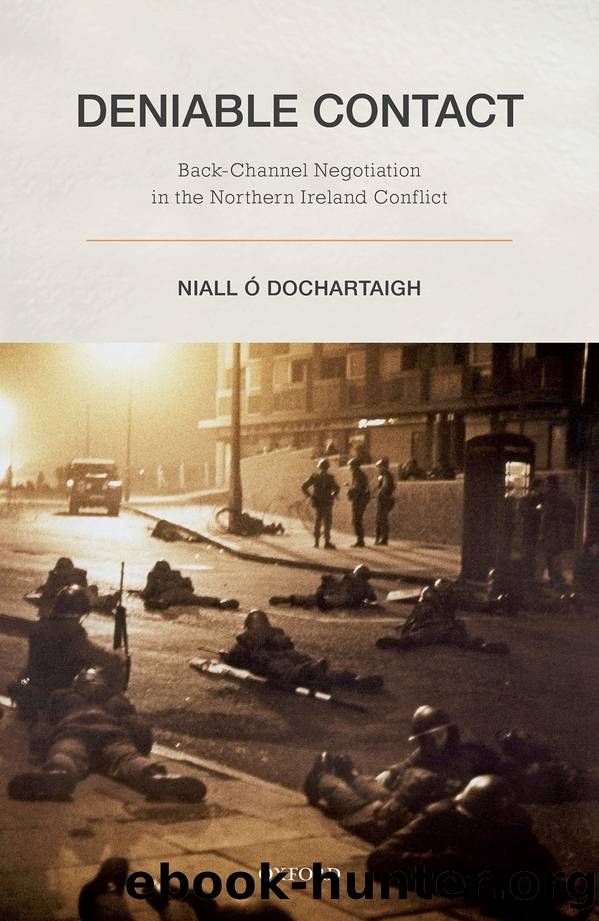Deniable Contact by Niall Ó Dochartaigh

Author:Niall Ó Dochartaigh [Ó Dochartaigh, Niall]
Language: eng
Format: epub
ISBN: 9780192647641
Publisher: OUP Oxford
Published: 2021-02-13T00:00:00+00:00
A Final Push for British Engagement with the IRA
Before the orthodoxy of this new British approach had become firmly established, there was a lively internal debate in the spring of 1976 about the wisdom of excluding the Provisionals. The debate was driven by the MI6/Foreign Officeâdominated office at Laneside, which a hostile new Secretary of State Roy Mason would abolish several months later. It illustrates the strong awareness of some within the state apparatus of two points that, in the 1990s, would be crucial in getting the British state to re-engage with the Provisionals. The first was that the Provisionals were actively seeking to end their campaign and they were willing to negotiate a compromise which would involve major concessions. The 1975 negotiations had taught this lesson. The second was that, contrary to the British stateâs propaganda, the Provisionals enjoyed sufficient support in the nationalist community that, regardless of British political and military initiatives, they would remain a significant force. They would not fade away. The implication of this latter understanding was that a settlement without the Provisionals was no settlement at all. In an analysis that pushed back against the gathering consensus on defeating the Provisionals, one civil servant wrote in a paper on the republican movement in May 1976:
Unless we take more determined steps to involve the leaders of the Republican tradition in political life, the formation and execution of a coherent long-term political strategy will failâ¦if we are to give real encouragement to the republican movement to pursue their aims politicallyâand now is as good a time as any in view of their reported disillusion over the lack of success of their military campaignâthen some such statement [a declaration of some kind] is requiredâ¦such a policy could finish the SDLP but that would be a small price to pay for peaceâ¦a politicised Provisional Sinn Féin would be more likely to produce political stability throughout Ireland as a whole than the continuation of a terrorist movement, however isolated. It is in our interest to see a strong Provisional Sinn Féin, if at the expense of the SDLP, so that the extremists are brought into the mainstream of politics and are forced to act politically and in due course responsibly.17
It is important to note that this was a âlosing paperâ, presenting a perspective that would be almost completely marginalized a few months later. In the context of the broader shift away from engagement in 1976, this looks like the dying kick of a policy of engagement with paramilitary groups that was now being criticized as âappeasementâ. With hindsight, however, it has the ring of prophecy. The document indicates two clear understandings: the Provisionals were prepared to accept a compromise settlement, and a settlement without them would âfailâ.
The prognosis that a politicized Provisional movement would eclipse the SDLP also indicates an awareness that the Provisionals were in tune with a far broader section of the Catholic population than was publicly acknowledged and that they were yet to fully realize their electoral potential.
Download
This site does not store any files on its server. We only index and link to content provided by other sites. Please contact the content providers to delete copyright contents if any and email us, we'll remove relevant links or contents immediately.
Phoenicians among Others: Why Migrants Mattered in the Ancient Mediterranean by Denise Demetriou(600)
american english file 1 student book 3rd edition by Unknown(599)
Verus Israel: Study of the Relations Between Christians and Jews in the Roman Empire, AD 135-425 by Marcel Simon(589)
Caesar Rules: The Emperor in the Changing Roman World (c. 50 BC â AD 565) by Olivier Hekster(569)
Basic japanese A grammar and workbook by Unknown(566)
Europe, Strategy and Armed Forces by Sven Biscop Jo Coelmont(517)
Give Me Liberty, Seventh Edition by Foner Eric & DuVal Kathleen & McGirr Lisa(492)
Banned in the U.S.A. : A Reference Guide to Book Censorship in Schools and Public Libraries by Herbert N. Foerstel(483)
The Roman World 44 BC-AD 180 by Martin Goodman(474)
Reading Colonial Japan by Mason Michele;Lee Helen;(467)
DS001-THE MAN OF BRONZE by J.R.A(460)
Imperial Rome AD 193 - 284 by Ando Clifford(453)
The Dangerous Life and Ideas of Diogenes the Cynic by Jean-Manuel Roubineau(451)
Introducing Christian Ethics by Samuel Wells and Ben Quash with Rebekah Eklund(451)
The Oxford History of World War II by Richard Overy(446)
Catiline by Henrik Ibsen--Delphi Classics (Illustrated) by Henrik Ibsen(422)
Language Hacking Mandarin by Benny Lewis & Dr. Licheng Gu(409)
Literary Mathematics by Michael Gavin;(407)
Brand by Henrik Ibsen--Delphi Classics (Illustrated) by Henrik Ibsen(388)
